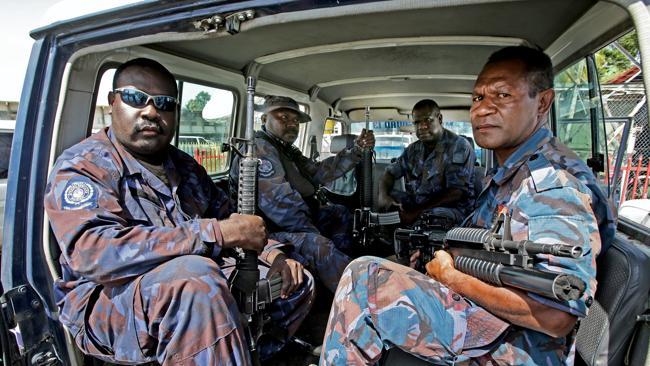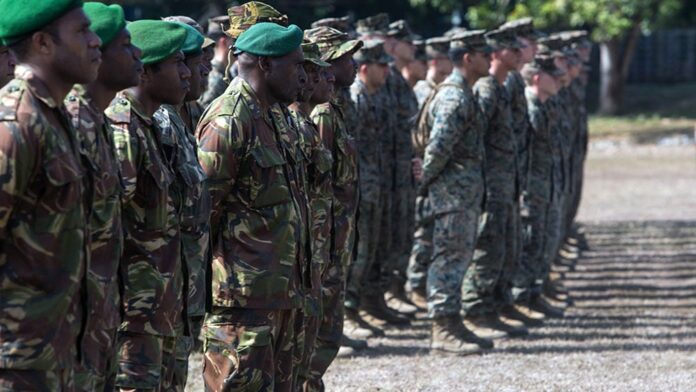SINCE independence, Papua New Guinea has carried the burden of maintaining ineffective security apparatuses and institutions that have been responsible for consuming a big chunk of the national budget year-in, year-out. On average, national security spending accounts for about more than one quarter of the national budget expenditure. And this has been the burden for the past 46 years since 1975.
Apart from scarce resources expended on security for special events such as the 2015 Pacific Games and the 2018 APEC Summit, PNG Defence Organisation (PNGDO), PNG National Intelligence Organisation (PNGNIO), Correctional Institutions Services (CIS), Royal PNG Constabulary (RPNGC), and the National Security Coordination Offices (OSCA, NSAC, NSC) have remained the premier security institutions chewing up significant slice of the nation’s pie.
However, other line agencies such as PNG Customs and Departments of Provincial Affairs and Foreign Affairs have performed exceptionally well. These line agencies have intercepted illegal entries of contraband goods as well as persons with defective and fraudulent travel documents.
Generally, all security institutions have underperformed when it boils down to assessing performances of ‘security agencies’ tasked with national security roles and responsibilities. Take Police for example. From the top brass down the rank and file, the organisation has been ‘under-performing’. If one thinks otherwise, then it may be serving the interests of other individuals and businesses. For the government to invest such a significant slice of the budget every year on national security actually demands better results and performances.
The traditional role of Police to safeguard the wellbeing of the citizens and their assets is fast becoming diminished resulting in loss of confidence and trust from the public. Instead, the public are now afraid of Police in fear of their lives because of high rate of brutality and recklessness inflicted upon the innocent people under the pretext of conducting their duties, which seems to be daily occurrences, and in fact such conducts have become inherent in the evolving police culture.

The top brass, that is, from the Commissioner down to the Station Commander (PSC) is subjected to the whims and/or ‘wheel and deal’, of the politicians and business houses and individuals, who constantly cause Police to take sides to serve them and other money wielding clients, which in many ways affect their ability to perform their normal police duties with impartiality. The other rank and file under PSC down are deployed as mere agents and manpower to serve politicians and money wielding individuals and business houses at the expense of the ordinary people. The days of ethics based police work are gone. The normal routine of Police to remain impartial and attend to complaints and disputes is no longer there. It has diminished. Throughout 80% of rural PNG, normal police work is non-existent. Police seems to be present only in cities and towns but still outnumbered and poorly trained and equipped.
The evolving culture is that Police has become a ‘rogue force’ as police personnel continues to be hired out as armed mob or private guards by politicians and business houses and money wielding people to safeguard their private operations, in many instances, to carry out illegal raids and evictions on innocent citizens they supposed to protect. For instance, the evictions carried out at ATS settlements in June 2021 have been done illegally because the perpetrators who claim to own that huge portions of land don’t have a ‘Title’, to the land. They have used some dubious Court Orders, not Titles, to carry out the evictions to forcefully claim land. And the Police force has been used time and again by the money wielding perpetrators against its own people in the illegal evictions which has resulted in some 5,000 Settlers displaced without making available alternative land to resettle.
The other agency under-performing is the Correctional Institutions Services (CIS) which has been confronted with series of ‘prison breaks’. On average, prison breaks are becoming yearly occurrences throughout the country, including Bomana Prison Facility which supposed to be enforcing Maximum Security Conditions. Whether it should be privatised or not is a matter for the Government to deliberate upon.
The PNGDO has been viewed as a liability in the absence of war, apart from the recent quelling of secessionists movement on Bougainville islands staged by armed rebels, a war that the government has faced defeat by giving in to the demands of the rebels. After World War 2, PNG has joined other pacifist countries in the region to remain neutral and focus on areas of national development. However, whilst outside threats may not be possible in the foreseeable future, internal threats caused by breakaway secessionists and criminal elements are real and demands government attention.
PNG does not have ambitions to build and modernise its defence organisation and hardware, despite sharing the western border with Indonesia, the most populous Muslim country that is in possession of one of the biggest armies in the world equipped with modern weapons system and military hardware supplied by both America and China, including arms from Russia. When Australia and Indonesia are involved in post cold war arms race and modernisation of their military hardware and personnel, they will go to war someday, and PNG’s soil is most likely to be used as battleground once again by Australia.
The PNGDO has failed to make use of its Engineering Battalion to construct roads and bridges around the country to self sustain its establishment and operations. The same could be said for other divisions like the Air Wing Battalion to service remote areas with fixed wing planes. However, when the government outsourced all the civil and related works to private contractors, it has become very expensive and costly for the GoPNG and subsequently the army has been denied the opportunities to involve in such civil works by the government.
The PNGNIO is another key security agency providing advice to the government of the day on matters of national security, particularly, security Intelligence advice pertaining to preventive measures to contain activities hostile to our national interests that are sponsored by our enemies and criminal elements and organised crime syndicates, including terrorist groups.
However, the PNGNIO has failed to include the most crucial aspect of its function and this I refer to ‘espionage’. May be PNG lacks the ability and the capability, including the capacity to take part in espionage operations, because it involves great deal of clandestine operations to gain economic, industrial and military advantages, often by spying and stealing secrets, blueprints of both economic industry and military technology hardware industries from other foreign powers, which otherwise cannot be transferred from one country to the other based on mutual cooperation and relations. China and other emerging powers have immensely used espionage operations to their great advantage in their development and modernisation aspirations by stealing blue prints and plans of economic or military industrial know-how and intelligence and intellectual properties.
In a nutshell, the government expects better results from security agencies to reflect what the money is worth, such that law and order is maintained in the communities on the part of Police or for the CIS Warder to rehabilitate and correct offenders or law breakers to become good citizens and for the Army to ensure that our territorial integrity and security of the nation and its people and their assets are protected against destructive forces, and for the PNGNIO and the Security Coordination Offices of OSCA, NSAC and NSC to cultivate, collate and disseminate relevant and accurate intelligence to enable the Government of the day to make well informed decisions on matters of national security and development.
In terms of chartering a way forward, the government has to quickly put together a Team of Experts to Review the Roles and Responsibilities of each and every Security Agency to allign them to support and sustain National Development aspirations of the country. For instance, the Review would ensure PNGNIO includes ‘espionage’ as one of its major core functions. As for the PNGDO, the Government has to fully utilise the Engineering division to carry out Civil Work contracts. And look at options to privatise some of the Prison Operations in the country and finally, look at promoting Provincial Police Constabulary and give away Police functions to the provinces and the national government will only overarching role of coordination and oversight.
This level of administration must be supported by business houses and development partners. Businesses must look at incorporating Police as part of their operations and put an end to increasing use of private security companies.
The author is a Private Consultant on both Government and Private Sector Affairs. He can be reached on +675 7272 6673 or WhatsApp 7462 8490 or email sekinolo.sawala@gmail.com

